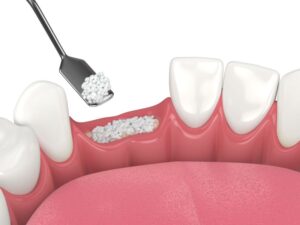
One of the best things about dental implants is that they replace the roots of missing teeth. Once they are inserted into your jawbone, they can provide an incredibly strong base of support for crowns, bridges, and dentures. However, for them to succeed, they need to be firmly anchored in your body, which means that you might need a bone graft before getting dental implants. What exactly is a bone graft, and why might your oral surgeon recommend that you receive one? This blog post explains.
What Is a Bone Graft?
A bone graft is a preparatory procedure that is sometimes performed before a patient receives dental implants. Its goal is to enlarge and fortify the jawbone so that it can serve as a strong base of support for implants.
During the surgery, bone material (which may be synthetic or natural) is added to weak or insufficiently sized portions of the jawbone. Afterward, the grafted material bonds with the existing bone.
There are multiple types of bone grafts, including:
- Socket preservation. This protects the integrity of socket at the site of an extracted tooth.
- Sinus lift. During a sinus lift, the sinus membrane is gently moved upward. Bone is placed underneath to hold it in its new place.
- Ridge augmentation. This procedure widens the alveolar ridge, the portion of the jawbone that surrounds tooth roots.
When Is Bone Grafting Necessary?
You might need a bone graft if:
- A significant amount of time has passed since your natural teeth were removed. The jawbone tends to automatically deteriorate when tooth roots are no longer present.
- You have/had gum disease. Advanced gum disease can cause significant damage to the jawbone.
- Your jaw is inadequately sized for other reasons. Genetics, past injuries, and other factors can contribute to the need for a bone graft.
How Can You Tell if You Need a Bone Graft?
The only way to know for sure if you will need a bone graft is to consult with a qualified dental team. They can use advanced imaging equipment to look beneath your gumline and determine if your bone is strong enough to support dental implants. They will customize your tooth replacement treatment plan based on the information they gather.
If you do need a bone graft, do not be disheartened. Although this procedure might lengthen your total treatment timeline, it can greatly increase the chances that your restored smile will be strong and healthy for many years to come.
Meet the Practice
Drs. Steve Koo, Thomas Weil, and William Shepard are the board-certified oral surgeons at Piney Point Dental Implant Center in Houston. Along with our talented support staff, they offer a full range of dental implant procedures, including multiple types of bone grafts. If you are interested in discovering what it would take to replace your lost teeth, we would be happy to speak with you. Contact our office at 713-597-7340.

